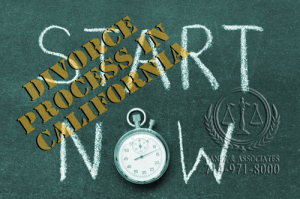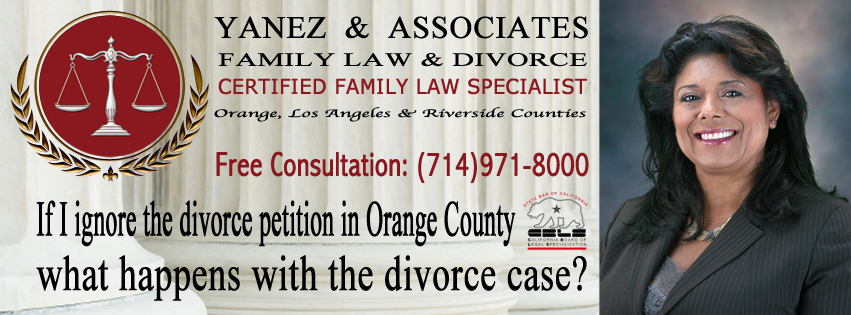What Happens to the Orange County Divorce Case if I Ignore the Divorce Papers?
If I ignore the divorce petition in Orange County what happens with the divorce case?: If I ignore the divorce petition in Orange County what happens with the divorce case?: Most of the information you will find online tells you what to do if you want to file for divorce or if you and your spouse have decided to file for a divorce, but there is not a lot of information for people who may face divorce papers from a spouse or partner but who do not want to deal with the divorce. Perhaps they are not ready to divorce.
When you are served with divorce papers, you do have the option to ignore them; however, you have to be willing to face the legal consequences of doing so. Ignoring your divorce papers will not stop the divorce from going through; the only way to stop the divorce is for the petitioner, or the spouse or partner who filed for divorce, to inform the court that they wish to stop the divorce process.
Beginning the Divorce Process in California
If your spouse or partner is ready for a divorce in California, he or she needs to determine where the divorce can be filed. The person who files the divorce papers is called the petitioner.
Without the consent of both parties, the petitioner is not eligible to file for a summary dissolution or a legal separation. If your spouse or partner chooses to discuss the impending divorce with you, you can choose to work together to determine the terms of your divorce agreement, but you do not have to. Not going along with the divorce still means that your spouse or partner can file, but they usually have to go through a litigated divorce, which can be costly and time consuming.
When the petitioner fills out the appropriate forms and files them with the court, the divorce process has started.
As the respondent, you have the right to be notified about the legal action because it involves you. The petitioner has to notify you about the divorce in time for you to appear in court. You will receive a copy of the court forms either from a process server or another adult who is not involved in the divorce.
When you receive the petition and summons for dissolution of your marriage or registered domestic partnership, you can choose to respond, or not to respond, in one of several ways. Whether you respond or not, the marriage or domestic partnership can end six months from the date the papers were originally filed by the petitioner.
Your Options for Responding to Divorce Papers in Orange County
Generally, you have four options for responding to divorce papers that have been served to you. You can do nothing at all. You can choose not respond to the court but work out your issues or come up with a divorce agreement with your spouse or partner. You can file papers with the court and not talk to your spouse or partner. You can also file papers with the court and discuss the divorce with your partner.
Ignoring Your Divorce Papers: Default Divorce, or Uncontested Divorce
As the respondent, you have 30 days to respond to the divorce papers once you have been served.
You do have the option of ignoring the divorce papers. However, if you ignore the papers and do not respond to either the Court or your spouse within 30 days, your spouse will probably get a default judgment, meaning they’ll probably get whatever they asked for in their initial petition served to notify you about the divorce. If you are okay with their decisions about the division of property and debts, child support, child custody, and spousal support this is fine.
Ignoring the papers is called “true default,” or uncontested, divorce and completely removes you from the divorce process. You are choosing not to have a voice in your divorce.
Responding to Your Spouse, but Ignoring the Court
In most cases, it is in your best interest to respond to the divorce papers. If you respond by communicating with your spouse but not filing paperwork with the court, you can work out a divorce agreement and have it notarized so that it can become part of your divorce order. Your divorce will still be considered uncontested, but you can have a say in the outcome.
In order to work out a divorce agreement with your spouse outside of the court, you must consider the terms of your divorce order. You should always consult a divorce attorney in California before and throughout the process of creating a divorce agreement.
You and your spouse should discuss things like dividing property, who will be responsible for paying debts, whether either of you should pay spousal or partner support, and child custody, visitation, and child support obligations. Your OC divorce attorney may be able to provide insight into the legalities of these agreements.
Default Divorce or Uncontested Divorce with a Written Agreement
If more than 30 days have passed, you have not filed a response with the court, and you and your spouse or partner have a written, notarized agreement about your divorce or separation, the petitioner must file the appropriate paperwork, including the notarized divorce agreement, with the court.
All forms must be reviewed and submitted to the judge for approval. Both spouses or domestic partners will receive a copy of the final judgment when the divorce is final.
What if You and Your Spouse or Partner Cannot Agree on the Terms of Your Divorce?
If you and your partner or spouse cannot agree on the terms of your divorce but you want to have a say in the outcome of your divorce, you should consider filing a response with the court. At this point, you will have a contested divorce, and you will have to go through litigation or a form of alternative dispute resolution to determine the terms of your divorce agreement.
Contact an Orange County Divorce Attorney for an
Uncontested or Contested Divorce
If you have been served with divorce papers in Southern California, it is in your best interest to contact a divorce attorney immediately. You have 30 days to choose how to respond, and failing to respond means giving up your voice in your divorce. Contact the skilled family law attorneys at Yanez & Associates today to schedule your free initial consultation today.













